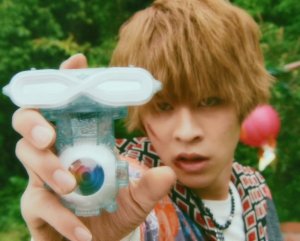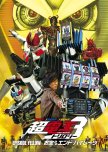Kamen Rider the Movie Episode Yellow: Treasure de End Pirates
0 oamenii au considerat această recenzie utilă
by AngelsArcanum
Yonemura delivers the best of Den-O again and ends it on a high note.
*pulled from my LB review*
Genuinely impressive that in spite of featuring one of my most hated Riders, this wound up being the best piece of Den-O side content.
I was a bit wary because Shoji Yonemura would be taking the writing credit over head Den-O writer Yasuko Kobayashi and apparently most of his credits outside of stuff that is originally his own is not good (most of the Movie War stuff I hear sucks). Then again, his few episodes of Den-O were ironically the funniest of the entire series, so I could've had some better expectations running off that precedent, but Daiki as the star of this one was still a big red flag. Meanwhile this winds up being one of the most energetic and THE most structurally sound of Den-O side content, with Daiki's enigmatic qualities, the cat and mouse dynamic with him and Reiji and all the twists and turns greatly propelling the narrative.
Daiki is a character who SOMETIMES, KIND OF does the right thing in a very antagonistic, roundabout, tsundere way, but a lot of times, it is usually a passive, complementary result of him selfishly going after what he wants, or just never dropping his tsundere, uncooperative schtick ever while being a bit well-intentioned, but it is typically that wall to him which never comes down which makes him so annoying. In this story, it does play up to Daiki's qualities bit by bit, suggesting he would literally kill himself to protect one of his treasures that he managed to steal but got damaged and would rather he not have the treasure at all by killing himself than to take it at less than perfect condition (or so he claims) and it still feels perfectly in-line with his ridiculous character, but also winds up being a perfect red herring to the story.
The major reveal while again circumstantially excusing his bullshit also thematically distills the major character motivations and inner conflicts of himself and Reiji with how things pan out and what those images represent, and leads to a genuinely touching shift in the story, it is done remarkably well.
Where Kobayashi's more "transparent storytelling efforts" (to phrase it somehow) in her Den-O films feel like they are motivated to get to a certain point of conventionally be driven by your usual heroes to some more black and white end point but results in a lethargic feeling of inevitability and indifference, here, Yonemura filters the story through an actively cryptic and suspect protagonist constantly clashing with a perhaps more morally earnest antagonist (even if their practices give grey areas) where the lead character's role is in part meant to deceive and annoy you, but ironically, it results in a big rug pull that is so much more narratively and emotionally coherent and powerful than Kobayashi's more direct efforts (even though Chapter Blue is confusing, it still feels like it is working towards a clear moral rather than feeling like a shitpost and then becoming a dramatic story as this does).
Genuinely solid, has me wondering if Den-O could've been better if it was Yonemura's story all along with how much potential this shows in spite of starring an irksome protag; strange way to end off the trilogy, but surprisingly good!
Genuinely impressive that in spite of featuring one of my most hated Riders, this wound up being the best piece of Den-O side content.
I was a bit wary because Shoji Yonemura would be taking the writing credit over head Den-O writer Yasuko Kobayashi and apparently most of his credits outside of stuff that is originally his own is not good (most of the Movie War stuff I hear sucks). Then again, his few episodes of Den-O were ironically the funniest of the entire series, so I could've had some better expectations running off that precedent, but Daiki as the star of this one was still a big red flag. Meanwhile this winds up being one of the most energetic and THE most structurally sound of Den-O side content, with Daiki's enigmatic qualities, the cat and mouse dynamic with him and Reiji and all the twists and turns greatly propelling the narrative.
Daiki is a character who SOMETIMES, KIND OF does the right thing in a very antagonistic, roundabout, tsundere way, but a lot of times, it is usually a passive, complementary result of him selfishly going after what he wants, or just never dropping his tsundere, uncooperative schtick ever while being a bit well-intentioned, but it is typically that wall to him which never comes down which makes him so annoying. In this story, it does play up to Daiki's qualities bit by bit, suggesting he would literally kill himself to protect one of his treasures that he managed to steal but got damaged and would rather he not have the treasure at all by killing himself than to take it at less than perfect condition (or so he claims) and it still feels perfectly in-line with his ridiculous character, but also winds up being a perfect red herring to the story.
The major reveal while again circumstantially excusing his bullshit also thematically distills the major character motivations and inner conflicts of himself and Reiji with how things pan out and what those images represent, and leads to a genuinely touching shift in the story, it is done remarkably well.
Where Kobayashi's more "transparent storytelling efforts" (to phrase it somehow) in her Den-O films feel like they are motivated to get to a certain point of conventionally be driven by your usual heroes to some more black and white end point but results in a lethargic feeling of inevitability and indifference, here, Yonemura filters the story through an actively cryptic and suspect protagonist constantly clashing with a perhaps more morally earnest antagonist (even if their practices give grey areas) where the lead character's role is in part meant to deceive and annoy you, but ironically, it results in a big rug pull that is so much more narratively and emotionally coherent and powerful than Kobayashi's more direct efforts (even though Chapter Blue is confusing, it still feels like it is working towards a clear moral rather than feeling like a shitpost and then becoming a dramatic story as this does).
Genuinely solid, has me wondering if Den-O could've been better if it was Yonemura's story all along with how much potential this shows in spite of starring an irksome protag; strange way to end off the trilogy, but surprisingly good!
Considerați utilă această recenzie?
















